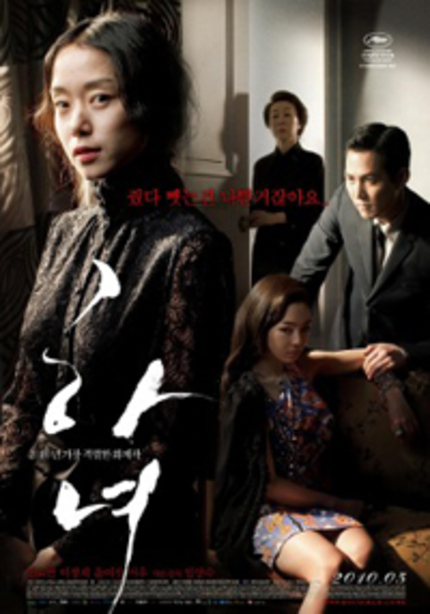TIFF 2010: THE HOUSEMAID (2010) Review

Sang-soo Im's The Housemaid could very easily have felt like it was made in the wrong decade. Typically, we don't get these kind of hothouse dramas on the screen, and indeed, Im had to reach back to the 1960 film of the same name for inspiration. But whereas that film was a sex-fueled thriller about a wild-eyed social climber, the 2010 remake is an incisive piece of social commentary about the widening disparity between the rich and the poor, the have's and the have-not's where everyone just happens to look fabulous.
Restaurant employee Eun-Yi toils away at her low-paying job and shares a cramped apartment and a narrow bed with her roommate in the hustle and bustle of the city. The recent divorcee isn't doing much with her childhood development degree and seems to just be drifting through life. It's no wonder she leaps at the opportunity to become the housemaid and nanny for a wealthy and connected family.
The family and house are picturesque: an adorable little girl who quickly warms to the new nanny, a fiercely loyal older housemaid who has served the family for generations and knows everything that goes on under the roof, the pretty and pampered young wife very pregnant with twins, and the husband, an accomplished businessman who is doted on by his wife and daughter. The wife, Hae--Ra (Seo Woo), doesn't think much of the new nanny, believing she's a bit simple, but it's obvious that her husband, Hoon (Jung-Jae Lee) isn't concerned with the mind of his new employee. A look here, some extra attention there and it's not long before he makes his move and seduces the admittedly willing Eun-Yi.
Why does Eun-Yi accept Hoon's advances? Fear? Curiosity? Maybe she's flattered at the attention. She can't possibly believe the preening narcissist has any feelings for her - he barely has any for his own family beyond a sense of ownership. No matter, the ensuing drama has less to do with her feelings about the affair and more to do with the hurt and jealousy of the pretty but not-so-nice little wife. Her discovery of the affair and the events subsequent to this are where the movie gleefully cuts into the streak of almost sociopathic selfishness that afflicts some segments of the monied class. Eun-Yi quickly becomes an insect, pinned under glass, a thing to be watched and destroyed by those whom circumstance and wealth have made more powerful.
Honestly, it gets pretty nuts from there. In the lead role, Jeon keeps you guessing about her character's motivations but never keeps you at arm's length. Eun-Yi is perhaps sweet and a little simple but not dumb. The real standout, however, is Yeo-Jong Yun as Byeong-Sik, the older maid who's been with the family across generations. She's the heart and soul of the house and in a way, the most culpable when things take their turns for the worst. She sees the affair coming, and it's not her place to stop it, and her loyalty to the family overrides her sympathy for the new employee. Even though her son is the Attorney General for Korea, she remains trapped in servility to a family of monsters.
But then, this is what the story's about: how power and wealth can corrupt and trap. It's about a family grasping at power and doing horrible things to maintain it. It's about the passing this legacy of amorality and greed across generations and making a virtue of coldness and selfishness. It's this rich social and emotional content that makes The Housemaid such a gripping, much-see film. That its cheery final scene plays out the way it does reinforces so much of what we've seen in recent years of the powerful enjoying the benefits of having no sense of shame.







